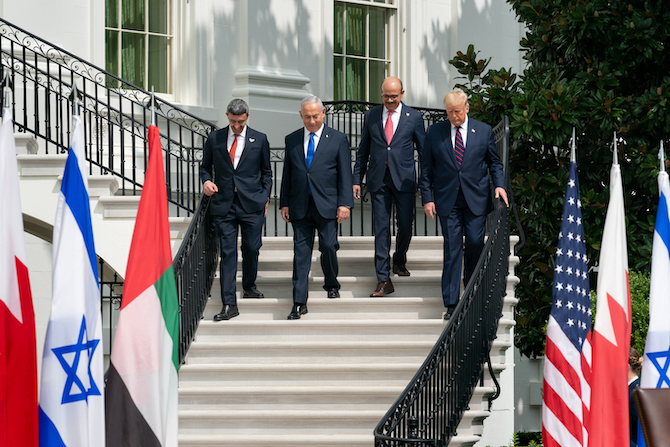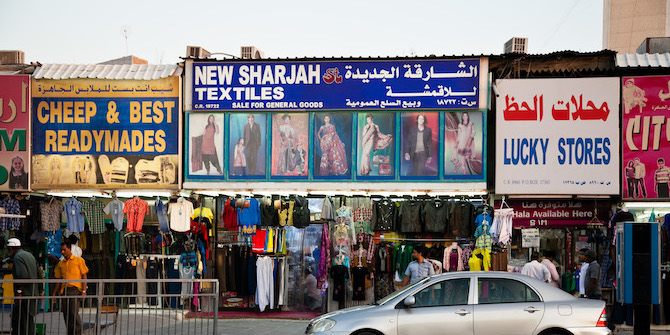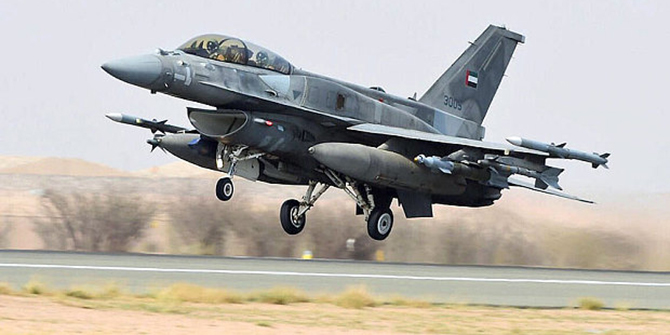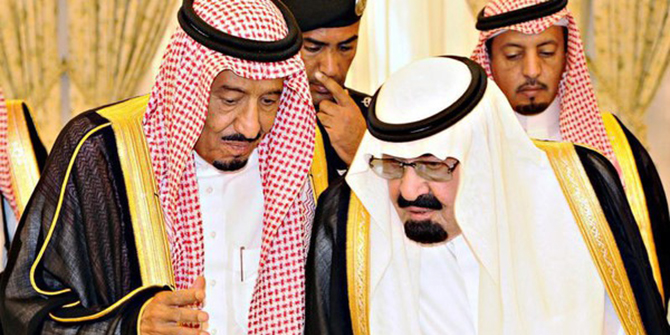by Raffaella A. Del Sarto and Charles Lawrie

When Israel and the United Arab Emirates agreed to normalise relations in August, it catalysed a flurry of peace deals between Israel and other Middle Eastern states. Last month, Bahrain became the second Gulf state to normalise relations with Israel; Sudan has just announced it would follow suit. Yet these agreements must also be understood as a carefully coordinated PR stunt that threatens to conceal a host of human rights violations in the region. US President-elect Biden gave the deal his blessing months ago, but his new administration should pay attention to what this may mean for the region.
Much has already been written about the strategic advantage Israel, the UAE and the US gain from being able to conduct their previously clandestine bilateral dealings in public. One obvious benefit is that the countries can now openly confront and contain the common enemy, Iran. More importantly, the deal with Israel allows the UAE to counteract recent US congressional proposals to limit US defence sales to the country and increase scrutiny of its operations in Yemen. Third, Abu Dhabi can now acquire advanced weaponry from the US, including F-35 fighter jets – the sale of which to the UAE Israel had previously resisted – as well as advanced technology from Israel itself.
Peace agreements with a third, a fourth, and a fifth Arab state after Egypt and Jordan represent an enormous diplomatic achievement for Israel. Small wonder that normalised relations were swiftly praised as a major contribution to peace and security in the Middle East, with Israelis fantasising about imminent vacations in Dubai. For Netanyahu, the agreements come as a welcome tonic amid ongoing protests over corruption and COVID-19 scandals. For Trump, the agreements were highly tweetable; they even garnered him a Nobel nomination.
Yet the belief that these deals will enhance regional security is naive. This argument is anchored in a dusty perception of the Middle East as a giant chessboard where security is defined in narrow, militarised terms. Such analysis is motivated by the simplistic logic of the balance of military capabilities, grand strategies and economic gains. Human rights, freedom and justice do not figure in this conceptualisation of security. But they should. A more careful analysis shows that this deal has losers as well as winners, and risks being a burden to regional security, not a boon.
The principal losers are the Palestinians, who will continue to live under repressive Israeli rule. This is Abu Dhabi’s reward to Israel for delaying the planned – and conspicuously unlawful – annexation of parts of the West Bank. While providing a fig leaf to the ongoing violation of Palestinians’ basic rights – which enhances neither Israeli nor regional security – the normalisation agreement augurs lucrative arms and surveillance equipment deals. Here, Israel has the technology, the UAE and Bahrain the money.
Indeed, UAE-Israeli trade in surveillance equipment is already a reality. High-tech Israeli companies, typically with the tacit blessing of the country’s Ministry of Defence, have been selling sophisticated mobile surveillance technology to the Emiratis for years. This includes spyware for hacking smartphones, used by the UAE regime against critics at home and rivals abroad. Abu Dhabi has even been trying to tempt Israeli graduates from the army’s cyber elite unit to work in the UAE with lucrative offers of employment. With the normalisation of relations, expect more cyber-tech deals to follow.
For Abu Dhabi, normalisation with Israel represents the latest phase of an expensive public relations campaign, which has succeeded in presenting the UAE as modern, tolerant and safe. Yet the UAE remains a repressive country with regional military designs and an appalling human rights record. According to Human Rights Watch’s 2020 World Report, its rulers show ‘no tolerance for any manner of peaceful dissent’. Emirati nationals and foreigners alike continue to be at serious risk of arbitrary and incommunicado detention, ill treatment, and torture if they are suspected of security-related offences. Access to legal assistance is denied and expectations of a fair trial remain an illusion. Migrant workers, who account for more than 85 percent of the UAE’s population, are often treated as little more than slaves by their Emirati employers. Bahrain is hardly a beacon of tolerance, either; in the same report, Human Rights Watch described the state of human rights in the country as ‘dire’. Sudan under Omar al-Bashir was a terrible abuser of human rights and, until a few days ago, it was on the US list of state sponsors of terrorism.
The UAE has flexed its influence abroad in equally dubious ways. In the wake of the 2011 Arab uprisings, it has financed authoritarian regimes and conducted various military interventions including the use of mercenaries. The Saudi-led coalition in Yemen, aided by Emirati troops and US arms, has engaged in dozens of unlawful attacks since 2015, some of which are likely war crimes. According to the UNHCR-appointed Group of Eminent Experts on Yemen, the UAE and UAE-backed forces have committed grave human rights abuses in Yemen, including maltreatment and torture, arbitrary arrests and detention, forced disappearance, and rape. Journalists are regularly harassed, intimidated and prevented from accessing areas controlled by UAE-backed forces. Despite Abu Dhabi’s announcement in June 2019 that it would withdraw most of its forces from Yemen, the UAE intends to maintain its military presence in Aden and the south of the country.
In Libya, Emirati support for General Khalifa Haftar, who is fighting the internationally recognised Libyan Government of National Accord led by Fayez Al-Serraj, is a clear violation of international law. As in Yemen, the Emirates have also been recruiting Sudanese mercenaries to fight in Libya, often recruited under the false pretext of working for private security companies. Haftar’s forces have been inundated with Emirati weapons, in blatant violation of the international arms embargo on Libya. A recent BBC investigation concluded that 26 unarmed military cadets in Tripoli were killed by a drone owned and operated by the UAE.
It is doubtless always positive when former enemies normalise relations and conclude peace agreements. They are particularly encouraging in a part of the world where a decline in oil demand threatens to destabilise the prevailing order and lead to further deteriorations in human security. Israel’s normalisation deals with the Emirates, Bahrain and Sudan may well be a step on the march to regional peace, but it must address rights and justice issues. Whoever thinks that sending advanced weapons and surveillance equipment to these states will contribute to peace and security in the Middle East should think twice.
Raffaella A. Del Sarto’s latest book, Israel Under Siege: The Politics of Insecurity and the Rise of the Israeli Neo-Revisionist Right, is available here from Georgetown University Press.







Well done, this is absolutely educating. Thank you for sharing this with us. I have no doubt that your reader base will continue to grow once people discovers more of your amazing publications.